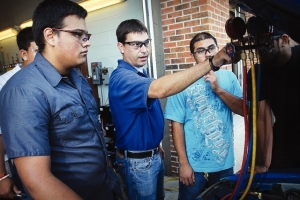Certificate program at WCC retrains students for work
By Phyllis Moore
Published in News on June 25, 2012 1:46 PM

News-Argus/MICHAEL BETTS
From left, Jose Luis Garcia, Santiago Vega-Castaneda, Javier Bautista and Jose Basa watch their instructor, Kevin Jordan, points to the pressure gauge used to test the air conditioning of a late model Mustang. The students are enrolled in the heating, air conditioning and refrigeration maintenance and repair program at Wayne Community College.
At 49, Robin Capps decided it was time for a career change.
But not because he grew bored with the machinist position he held for nearly 30 years.
Losing his job as a machinist and facing "not a lot of manufacturing opportunities" left him at a crossroads.
Starting last fall, he enrolled in the heating, air conditioning and refrigeration maintenance and repair program at Wayne Community College.
"This is my second time around," Capps said of his return to WCC, where he had initially received his training as a machinist.
He's learning a lot, he said -- about repairing home units, refrigerators, ice-makers and appliances.
But mostly, he pointed out, the program, as well as the potential to earn a variety of certifications, will prepare him to re-enter the work force.
"Because you have got the certification, you have got a whole different range of things that you can do," he said.
As he anticipates graduating in December, Capps said he is optimistic about his prospects.
"I'm pretty confident I'm going to be able to find something," he said. "And even if I don't, I can always go out and work for myself."
David Gardner, instructor in the HVAC program, said that's the most rewarding part of his job.
"My main thing is employability -- give them everything that gives them confidence and knowledge when they're out there on their own," he said.
Craig Foucht, transportation systems technology department chair, agreed, saying providing certifications better prepares students for the future.
"I think that it also gives them a realistic view of what's required to work in the industry," he said. "They're always going to be exposed to continuing their education, always going to be required to continue certifications."
Kenneth Jones, a student in the HVAC program, was a dispatcher at a trucking company but was laid off when "times got tight."
"This was my opportunity to come back to school, learn about air conditioning," said the 32-year-old, whose father had also worked in that field.
Since enrolling in the program in Aug. 2011, Jones said he has already earned four certifications.
"With this, it opens up a whole bunch of opportunities," he said. "I feel the more certificates you have the better you market yourself and it's all about selling yourself in the field."
Certificate programs -- designed to provide entry-level employment training -- are the fastest growing area of post-secondary credentials in the country, officials say. In 1980, they represented 6 percent of awards handed out during commencement, and now are closer to 22 percent.
The same trend is reflected at WCC. In 2001, among the 295 graduates, 55 certificates were handed out. In 2012, there were 604 graduates, receiving 467 associate degrees, 80 diplomas and 159 certificates.
The college now offers nearly four dozen certification choices.
There are many advantages to the option -- including affordability and flexibility of obtaining them, quick completion time, added value to the degree and boosted employability.
Officials say studies show that in a competitive market, those with certifications can earn 20 percent more than those with a high school diploma and sometimes more than those with two- and four-year degrees.
"Most of our graduates with certificates start out making more than four-year degree candidates," said Ernie White, division chair of applied technology, which boasts the larger number of certifications offered. "It also increases hirability, especially if they have more certificates than their competition."
The accomplishment also serves as an incentive on the road to completing a college program.
"I think that students, because of the difference in traditional (programs), they get to feel accomplishment fairly quickly," said White. "I see it as a motivational tool. It keeps the light burning toward the two-year degree."
White oversees four primary areas at WCC -- agriculture and natural resources, engineering and manufacturing technology, industrial technologies and transportation. There are also a smattering of individual certifications in other programs, such as cosmetology, criminal justice and early childhood.
Starting out, students may be unaware of the additional option. They, like workers returning to college for additional training, are advised by college counselors on how to pursue the training.
"It's caught on," said Dr. Peggy Teague, vice president of academic affairs. "Most of our regular students come wanting a degree but now they're catching on that they want to complete a certificate if they don't finish that two-year degree. More and more are choosing to stack those credentials."
The supplemental program is also beneficial to another segment of the public, she added.
"Many people in the community don't consider going to college because they think, 'I can never do it,'" she said. "The certificate offers them that opportunity. The certificate doesn't require them to take English courses or math courses or the typical things that people think of when they think of college.
"But it allows them to jump into their subject matter, their skill level, so there's a market or a population out there ... and it gives them that first opportunity to come try us, try a technical area and see if they can be successful."
Her advice to those hesitant to enroll in a full course college program -- try one course at a time.
